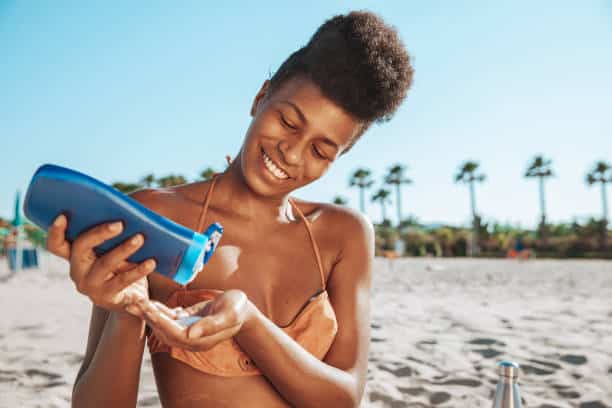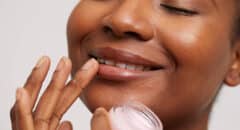
I sincerely hope that your summer has been spent floating carefree in a pool, enjoying endless cocktails at a rooftop bar, and creating memories you’ll talk about for years to come at the family cookout. The hot sun can’t stop us from having a good time!
The hot sun can, however, cause more health problems than most of our community is aware of. Sunscreen use is still not nearly as popular among Black people compared to other racial and ethnic groups. It’s not too difficult to understand why – only around 14 percent of us have experienced sunburn in our lives.
Unfortunately, sunburn is not the only danger that the sun’s rays can cause. Let’s get into what other forms of sun damage might look like on brown skin and what you can do to ensure your skin is protected.
RELATED: Can Black People Sun Burn?
How the Sun Harms Skin
Sunlight reaches us on Earth as a blend of visible and invisible energy waves. Among these are ultraviolet (UV) rays, which fall on the shorter end of the spectrum. While long waves, such as radio waves, pose no risk to human health, shorter UV rays can have significant effects on the skin.
Two types of UV rays make it through Earth’s atmosphere: UVA and UVB. UVA rays are the longest and can reach deeper layers of the skin, while UVB rays are shorter and primarily responsible for causing sunburn. Both types, however, can impact the skin’s health over time.
When UV rays penetrate the skin, they can disrupt vital cellular processes that influence skin growth, repair, and appearance. Prolonged exposure may lead to a breakdown in the skin’s elasticity, contributing to early signs of aging like wrinkles, skin thickening, leathery texture, or thinning that resembles tissue paper.
Excessive sun exposure increases the risk of skin cancer—the most common cancer in the U.S. UV rays can damage DNA in skin cells, leading to uncontrolled cell growth and, potentially, tumors. These growths may be benign or cancerous.
The most common types—basal cell and squamous cell carcinoma—affect millions annually and are typically treatable. Melanoma, though less common, is more serious and can spread to other organs. It is caused by pigment-producing cells and is linked to risk factors such as numerous or irregular moles, a family history of skin cancer, and severe sunburns, especially in childhood.

RELATED: Black-Owned Sunscreen Brands Designed for Melanated Skin
How Melanin Protects Us
Melanin is the natural pigment in your skin, hair, and eyes—and it plays a big role in protecting you from the sun. When your skin is exposed to UV rays, it produces more melanin as a defense mechanism to absorb and scatter the harmful rays. That’s why your skin may tan after sun exposure. While melanin offers some built-in protection, it’s not enough on its own—so sunscreen and other sun safety habits are still essential for everyone, no matter your skin tone.
For Black people, higher levels of melanin provide more natural protection against UV rays compared to lighter skin tones. This increased melanin helps absorb and block more of the sun’s harmful radiation, which can lower the risk of sunburn and certain types of skin damage. Hello, magic!
But don’t get too cocky just yet. It’s important to remember that melanin doesn’t make skin immune to sun-related issues. Skin cancer, hyperpigmentation, skin diseases, and premature aging can still occur.
Sun Damage on Melanated Skin
Thanks to melanin, our skin is less likely to experience sunburn, although it is still possible! There are other signs of sun damage that we should be on the lookout for:
- Dark spots or hyperpigmentation, especially in areas frequently exposed to the sun
- Uneven skin tone that persists or gradually worsens over time
- Dry, rough, or scaly patches that may feel thicker or look slightly lighter than the surrounding skin
- Wrinkles or fine lines, particularly around the eyes or mouth
- Loss of skin elasticity, leading to sagging or a leathery texture
- Ashy or grayish appearance in areas of chronic sun exposure
- Small bumps or growths that may bleed, itch, or change in size or color
- Persistent discoloration following sunburn or irritation
These signs could be warnings of skin diseases and cancers caused by the sun.

RELATED: Are You Making These Sun Safety Mistakes?
How to Protect Our Melanin
It’s about more than sunburn. Ultimately, as much as we enjoy the sun, it can also be a very real threat to our health. Our melanin does its part to protect us, but it can only do so much. Make it a priority to love your skin back by taking these skincare precautions YEAR ROUND, as sun rays are just as strong even on cloudier days:
- Don’t skip the sunscreen: use a broad-spectrum sunscreen with SPF 30 or higher to protect against both UVA and UVB rays. Apply about a shot glass full 20 minutes before heading out, and reapply every two hours—or more often if you’re swimming or sweating.
- Find some shade: the sun’s rays are strongest between 10 a.m. and 4 p.m., so it’s best to stay in the shade during those hours when you can. Getting out of direct sunlight goes a long way!
- Dress smart: cover up with long sleeves, pants, and tightly woven fabrics for better protection. A wide-brimmed hat and UV-blocking sunglasses can go a long way in keeping your face and eyes safe.
- Eat your way to healthier skin: load up on antioxidant-rich foods like leafy greens, berries, and carrots to help your skin fight sun damage.
- Show damaged skin some love: topical treatments like retinoids or vitamin C can help improve sun-damaged skin. For more noticeable results, ask a dermatologist about options like laser treatments.
- Remember the little things: surfaces like water, sand, and snow reflect sunlight, so don’t forget to protect yourself even in the shade. And always reapply sunscreen after swimming or sweating—your skin will thank you!









